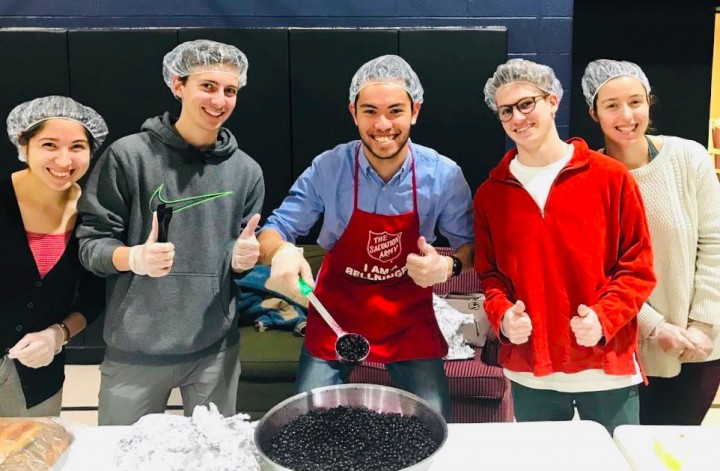Community Engaged Learning With Ruth Heindel

Of the myriad of academic opportunities offered at Kenyon College, among the most unique are the community-engaged learning courses. This spring is Ruth Heindel's first semester teaching "Introductory Environmental Lab," an environmental science class with an emphasis on fieldwork. The class provides a comprehensive hands-on introduction to environmental science in the field and laboratory techniques including research methods. Students learn to assess water quality, soil and ecosystem composition.
Kenyon alumna Chrissie Laymon and her family recently moved to a new farm in Knox County. They are in the process of transitioning it to regenerative farming practices that will increase soil fertility, diversity of insects, pollinators, and animals on the land, and reduce the flow of fertilizer into nearby streams. Laymon reached out to biology professor Ruth Heindel to seek a collaboration with Kenyon students to conduct the research necessary to make those changes.
Laymon's request connected naturally to the goals of Kenyon's Introductory Environmental Lab course, Heindel explains, because community engagement is an important part of environmental science. "Whether they're working for a consulting firm or a nonprofit ... I think that having these partnerships with the community and communicating these findings back to a community partner are important skills in addition to the more hands-on skills of collecting a soil sample and analyzing it in a lab," says Heindel.
Heindel is optimistic about the course's academic and community potential despite the current COVID climate. All the fieldwork conducted for the course takes place outdoors and there's no shortage of space on the farm, so the risk of COVID is significantly minimized. The class had an introductory conversation with Laymon over Zoom to acquaint themselves with the semester-long project on her farm. At the end of the course, when students present their findings to Laymon and other community members and faculty, it will also be over Zoom. Heindel notes that it would be wonderful to be able to experience those conversations and presentations in person and looks forward to that being an option in future years.

Community-engaged learning courses at Kenyon provide vital insight for the Kenyon community. "It's important for students here on campus to have a sense of where they are ... to really think about how Kenyon is situated in a community," Heindel says, describing how students' perceptions of the Knox County community are sometimes skewed by political or cultural assumptions. Community-engaged learning courses like Introductory Environmental Lab give students the opportunity to engage directly with the community and in doing so, alter those skewed perceptions. "I'm really eager for students to get to know some of the community members and to think about what it's like to run a farm in rural Ohio. That's something that you don't necessarily think about often as a college student," Heindel adds.
The fieldwork and findings produced from this course form a mutually beneficial relationship. Laymon is excited about this opportunity to learn about what's happening on her own farm and to provide an example to the surrounding community about how regenerative farming can be successful. That gives students the motivation to take their work seriously to produce data that might convince other farmers to transition to more sustainable farming practices. The students know that the data they are producing is not just an exercise; it will be put to use. Laymon's role introduces a new dimension to the class. Heindel shares how excited and inspired students are by a Kenyon alum who can talk about what it is like to make decisions about changing farm practices as a long-term member of the farming community. Working with Laymon's farm brings an element of direct engagement and a diversity of perspectives to students' academic experiences.
Heindel's personal draw to environmental science began with a deep appreciation for beautiful landscapes. Eventually, that appreciation evolved into a realization of the fragility of these landscapes. She realized how much we rely on the places we call home, and how susceptible to change they are. In Heindel's class, students learn to see environmental science as a way to engage with the landscapes and the communities that provide so much for us.
This article first appeared in the Office for Community Partnerships spring 2021 newsletter.